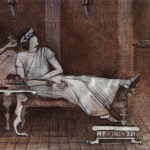This article related a series of lovely experiments identifying a means of creating regulatory T cells (nTregs) with the capacity to suppress and/or ameliorate autoimmune disease. The “suppressor” cells of old have evolved to today’s Tregs. Naturally occurring Tregs (expressing CD4 and Fox3), nTregs, are important in immunologic orchestral harmony, critically helping assure tolerance and immune homeostasis. Their adoptive transfer has had salutary effects in experimental studies of autoimmune disease. However, nTregs become unstable and dysfunctional in the presence of certain cytokines, particularly interleukin-6.
The studies from Zheng and collaborators found that pretreatment of nTregs with all-trans retinoic acid (atRA) maintained the phenotype and function of nTregs. Zheng and colleagues then went on to demonstrate that atRA-treated nTregs halted progression of disease and indeed improved symptoms, in the model of collagen-induced arthritis in mice. There were also correlative changes in certain immune reactants. There wasn’t examination of animals’ synovial tissue. This has not yet been extended to other or better animal models of human rheumatic disease, but it is clearly good and important work. We may be treating certain patients with these nTregs sooner than you think.
When Does the Music Stop?
To continue (perhaps to push) the analogy, we know now that autoantibodies occur in individuals before development of (rheumatic) disease. When does disease, like RA, begin, and where? Why? When does the music become dissonant, why, and how can we fix it?
We really need to know what triggers disease and the transitions through the various stages of disease expression and evolution, how, when, under what circumstances, and where. Only when we have such information will we be able to try to truly have an impact on the course of rheumatic disease.
I came across a brief report and then a somewhat more detailed paper attempting to address this, but they left me somewhat unsatisfied.5,6 Fifty-five RF- or anticitrullinated protein antibody–positive, otherwise normal individuals underwent physical and dynamic contrast enhanced magnetic resonance imaging (MRI) exams and arthroscopic synovial biopsy. All those studied had normal physical and MRI exams (comparable to normal individuals who also underwent imaging and synovial biopsy). The one patient with some detectable cell/mediator abnormalities on biopsy had patello-femoral osteoarthritis. During 37 months of follow-up, four individuals developed clinical RA; their baseline findings could not be differentiated from others.
Although this was an ambitious study, I was disappointed that the results were not more helpful. No genetic information was provided. We know that more than just genetic predisposition is needed to express our diseases, and so, too, it may be for just having autoantibodies. We really need to know what triggers disease and the transitions through the various stages of disease expression and evolution, how, when, under what circumstances, and where. Only when we have such information will we be able to try to truly have an impact on the course of rheumatic disease. We’ll doubtless see extensive and comprehensive studies elucidating these key issues that have an impact on our understanding of disease mechanisms as well as the approach to prevention and early diagnosis and treatment.
